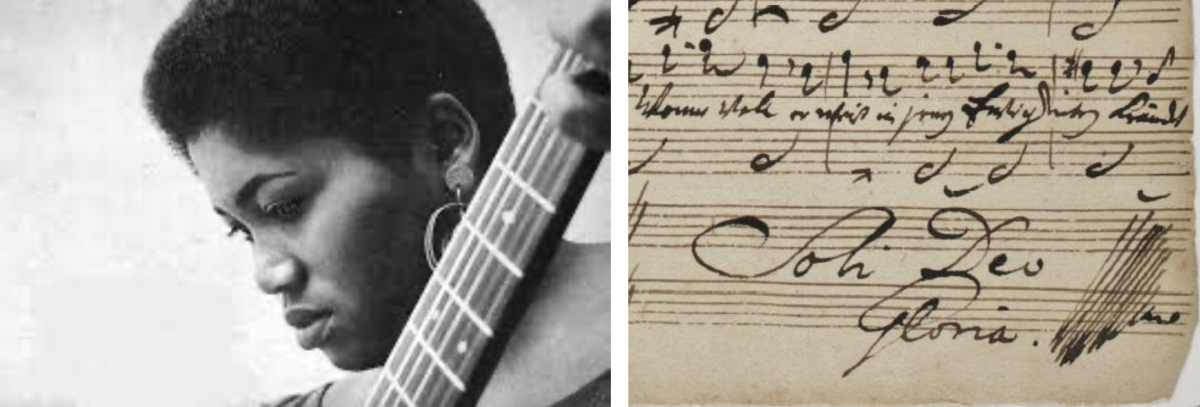
Odetta, with a detail of one of J.S. Bach's autograph manuscripts signed "Soli Deo Gloria" ("To the Glory of God Alone"), a dedication that the composer added to every piece of sacred music and many secular pieces as well.
On July 18, 2020, a recording of Odetta performing the spiritual "Glory, Glory" opened a concert of Bach Cello Suites at Yellow Barn. Following the concert, alumna cellist Annie Jacobs-Perkins wrote the following biographical note for Odetta:
In his letter to America penned days before his death, activist and Representative John Lewis summarized the words of Martin Luther King Jr. that meant so much to him as a young man. “He said we are all complicit when we tolerate injustice. He said it is not enough to say it will get better by and by. He said each of us has a moral obligation to stand up, speak up, and speak out. When you see something that is not right, you must say something. You must do something. Democracy is not a state. It is an act, and each generation must do its part to help build what we called the Beloved Community, a nation and world society at peace with itself” (New York Times, July 30 2020).
The folk and blues singer Odetta worked tirelessly to shape that Beloved Community. Born in 1930 in Birmingham, Alabama, she was a favorite artist of King’s and sang with him through many of the events that made him an icon in American history. She was there for the walk from Selma to Montgomery, King’s “I have a dream” speech, a civil rights demonstration for President Kennedy, and for countless other civil rights events. She is known affectionately as the “voice of the civil rights movement.” President Bill Clinton awarded her the National Medal of Arts and Humanities in 1999, and if she had not died from heart disease shortly before at age seventy-seven, Odetta would have performed at President Obama’s inauguration ceremony in 2008.
Although Odetta did not reach the huge popular success of folk artists such as Bob Dylan, Joan Baez, Harry Belafonte and Janice Joplin, all of them cite her as a major influence on their work. In a Playboyinterview from 1978, Dylan said that “The first thing that turned me on to folk singing was Odetta.” Odetta’s family moved to Los Angeles when she was six-years-old, and it was at that time that she began studying voice. She trained in opera and theater at Los Angeles City College, but realized her love of folk music during extra curriculars and self-reflection.
During an interview with The New York Times, Odetta stated that the recorded work songs she heard as a very young child in Alabama had a huge influence on her music—they served as a medium to find pride in self. In addition to her important role as an activist, Odetta is remembered for being unashamedly and unabashedly herself. At a time when black women faced social pressure to straighten their hair as a symbol of white respectability, Odetta appeared in front of thousands of audience members time and time again with her hair naturally curly. She said, “You’re walking down life’s road, society’s foot is on your throat, every which way you turn you can’t get from under that foot. And you reach a fork in the road and you can either lie down and die or insist upon your life.”
Watch the July 18th concert stream in its entirety:
